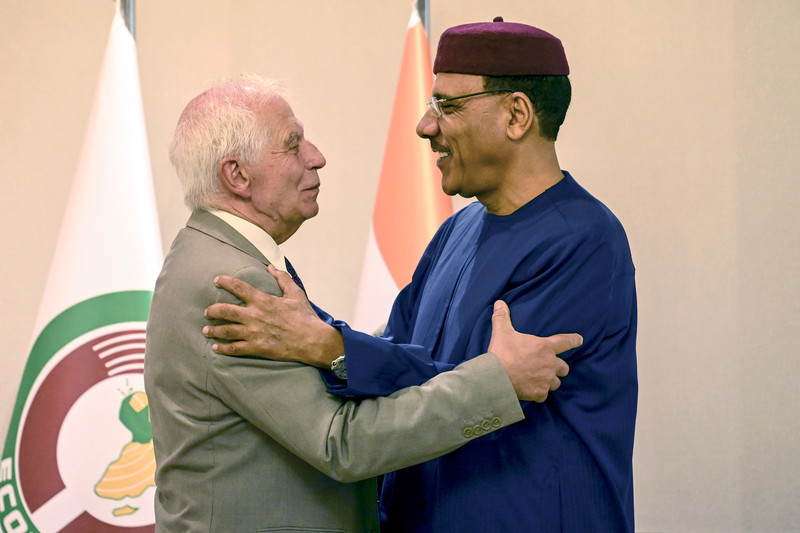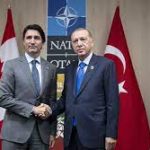The sudden toppling of the EU’s main ally in the Sahel has punctured Western schadenfreude on Russia’s Africa-summit flop.
Overnight news on Thursday (27 July) that Niger’s army had removed president Mohamed Bazoum from power took Europe by surprise, coming shortly after EU foreign affairs chief Josep Borrell visited Niamey to praise Bazoum’s pro-democratic reforms.
“The HRVP [Borrell] was in Niger last week, everything was going well with the mission, everything was going on track,” his spokeswoman said, referring to an EU military-training mission there.
When asked by press in Brussels if EU-trained soldiers might have taken part in the putsch, the spokeswoman said the EU mission began work only in February and its training courses “have not yet started”.
When asked if any foreign actors were involved in the coup, she added: “We’re currently evaluating the situation … [things are] still very fluid”.
The EU, France, the UK, and the US condemned the putsch and urged soldiers to free Bazoum.
“We advise British nationals to remain indoors,” the UK foreign office said in flash security advice to expats.
The US state department said: “At this time the city is calm. We advise everyone to limit unnecessary movements, and avoid all travel along Rue de la République [a central boulevard in Niamey]”.
If the putsch succeeds, it will represent a major setback for Western countries trying to maintain political and military influence in the region.
France had recently moved its centre of operations to Niger after Mali kicked out international troops fighting jihadists in the Sahel.
The strategic implications were “very serious … not only for the French and EU but also the US, which maintains a drone base there”, said Alex Vines, an Africa expert at British think-tank Chatham House.
“The putschists in their statement last night said all existing [international] agreements would be respected — but told external partners to keep their distance regarding the coup,” he added.
The Niger shock comes amid a geopolitical tug-of-war between the West and Russia in Africa.
Niger borders Mali and Libya where Russian mercenary group Wagner have their largest numbers of fighters. It also borders Burkina-Faso, where Wagner is trying to build a presence.
The coup coincided with Russian president Vladimir Putin’s summit with 17 African leaders in St Petersburg the same day.
Borrell’s spokeswoman noted on Thursday that far fewer leaders came to Russia than during Putin’s last Africa summit in Sochi in 2019.
She also said the EU had far more to offer Africa than Russia in terms of aid and investment.
But if that was the case, St Petersburg seemed like a better place than Brussels in which to plot intrigues on Niger’s future this week.
Putin’s guests included Mali and Burkina-Faso junta leaders Assimi Goita and Ibrahim Traore.
The Wagner boss, Yevgeny Prigozhin, was also there, according to a photo of him shaking hands with the president of the Central African Republic, which was posted on social media, even though Wagner had recently mutinied against the Kremlin.
For Chatham House’s Vines, Russia had no hand in the Niger events. “Not at all, looks like this is fully driven by local politics,” he told EUobserver.
“We look forward to a speedy resolution of this internal political crisis in the interest of restoring civil peace for the benefit of our friendly Nigerien people. We count on the speedy release of President M. Bazoum,” the Russian foreign ministry also said.
But Bazoum had complained in May about anti-Western Wagner propaganda while on a state visit to London.
And some Niger coup supporters also waved Russian flags and chanted anti-French slogans, Reuters reported, prompting speculation.
“This is Wagner modus operandi all over,” said Joana de Deus Pereira, a Russia specialist at British defence think-tank the Royal United Services Institute.
The low attendance at the Africa summit might be a PR failure for Russia, but it would be a mistake to underestimate Putin’s tenacity, she added.
“For Putin, this is a marathon, most probably an Iron Man race — you struggle, you fight, you endure,” she said.
By ANDREW RETTMAN
Source: EU Observer



